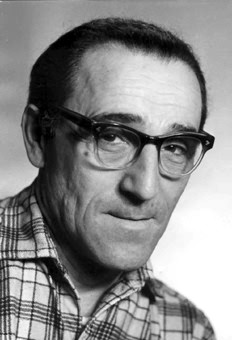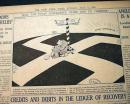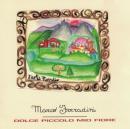Odcięto nas drutem od świata
Ze wszystkich spędzono nas stron,
I w serce tęsknota się wplata
I bije, i bije jak dzwon.
I w serce tęsknota się wplata
I bije, i bije jak dzwon.
Pasiasta na grzbiecie twym szmata
Byś pomniał – kim jesteś i gdzie?
Do piersi żeś numer przyłatał
I trójkąt czerwony i “P”.
Do piersi żeś numer przyłatał
I trójkąt czerwony i “P”.
I dźwigasz swój łeb ogolony
Jak brzemię nieznanych ci win,
I czekasz na dzień utęskniony
Gdy wrócą ci Wolę i Czyn.
I czekasz na dzień utęskniony
Gdy wrócą ci Wolę i Czyn.
Nie cieszą cię gwiazdy ni słonce,
Nie bawią cię noce ni dni -
I czekasz, a z tobą tysiące
Pasiastych, golonych, jak ty.
I czekasz, a z tobą tysiące
Pasiastych, golonych, jak ty.
Czerwienią się krwią pieśni słowa
Tak wielki w nich smutek i żal,
I płynie twa pieśń obozowa
Za druty – w nieznaną ci dal.
I płynie twa pieśń obozowa
Za druty – w nieznaną ci dal.
Ze wszystkich spędzono nas stron,
I w serce tęsknota się wplata
I bije, i bije jak dzwon.
I w serce tęsknota się wplata
I bije, i bije jak dzwon.
Pasiasta na grzbiecie twym szmata
Byś pomniał – kim jesteś i gdzie?
Do piersi żeś numer przyłatał
I trójkąt czerwony i “P”.
Do piersi żeś numer przyłatał
I trójkąt czerwony i “P”.
I dźwigasz swój łeb ogolony
Jak brzemię nieznanych ci win,
I czekasz na dzień utęskniony
Gdy wrócą ci Wolę i Czyn.
I czekasz na dzień utęskniony
Gdy wrócą ci Wolę i Czyn.
Nie cieszą cię gwiazdy ni słonce,
Nie bawią cię noce ni dni -
I czekasz, a z tobą tysiące
Pasiastych, golonych, jak ty.
I czekasz, a z tobą tysiące
Pasiastych, golonych, jak ty.
Czerwienią się krwią pieśni słowa
Tak wielki w nich smutek i żal,
I płynie twa pieśń obozowa
Za druty – w nieznaną ci dal.
I płynie twa pieśń obozowa
Za druty – w nieznaną ci dal.
envoyé par Riccardo Venturi - 4/4/2017 - 03:22
Langue: anglais
La traduzione inglese proveniente da Questa pagina
English translation reproduced from This page

English translation reproduced from This page

Zbigniew Koczanowicz
This song was written in April of 1945 by Zbigniew Koczanowicz at Falkensee, a sub-camp of Sachsenhausen where he was interned (after Auschwitz and Gross-Rosen). The song was also known as "Marsz Zbyska Koczanowicza" (after the lyricist). It apparently had some association with the clandestine "camp patrol" that was formed by the remaining prisoners of Falkensee in 1945, among whom was Koczanowicz. This "patrol" supposedly knew of the German arsenal of secret weapons and took arms from it to defend themselves against the prison guards. According to Aleksander Kulisiewicz, the melody to "Pieśń Obozowa" was adapted by Koczanowicz from a nineteenth century Russian folksong. Koczanowicz's poem was later set to an original melody by his fellow prisoner, Ludwik Żuk-Skarszewski.
CAMP SONG
Separated from the world by barbed wire,
We're rounded up from everywhere,
The longing woven into our hearts,
Throbs like the ringing of a bell.
The longing woven into our hearts,
Throbs like the ringing of a bell.
You with the striped rag on your back,
Could you forget who you are - and where?
They stitched a number to your breast,
A red triangle and the letter "P",
They stitched a number to your breast,
A red triangle and the letter "P".
And your shaved head serves to remind you,
Of the burden of your unknown sins.
And you yearn for the day
When your will and your purpose return.
And you yearn for the day
When your will and your purpose return.
Neither stars nor sun bring you happiness,
Neither day nor night yield pleasure.
You stand and you wait, dressed in stripes and shaved bare,
With thousands of men like yourself.
You stand and you wait, dressed in stripes and shaved bare,
With thousands of men like yourself.
The words of this song are stained with our blood,
Within them are sorrow and grief,
Yet your camp song will carry beyond these barbed wires,
To a distant place unknown to you.
Yet your camp song will carry beyond these barbed wires,
To a distant place unknown to you.
Separated from the world by barbed wire,
We're rounded up from everywhere,
The longing woven into our hearts,
Throbs like the ringing of a bell.
The longing woven into our hearts,
Throbs like the ringing of a bell.
You with the striped rag on your back,
Could you forget who you are - and where?
They stitched a number to your breast,
A red triangle and the letter "P",
They stitched a number to your breast,
A red triangle and the letter "P".
And your shaved head serves to remind you,
Of the burden of your unknown sins.
And you yearn for the day
When your will and your purpose return.
And you yearn for the day
When your will and your purpose return.
Neither stars nor sun bring you happiness,
Neither day nor night yield pleasure.
You stand and you wait, dressed in stripes and shaved bare,
With thousands of men like yourself.
You stand and you wait, dressed in stripes and shaved bare,
With thousands of men like yourself.
The words of this song are stained with our blood,
Within them are sorrow and grief,
Yet your camp song will carry beyond these barbed wires,
To a distant place unknown to you.
Yet your camp song will carry beyond these barbed wires,
To a distant place unknown to you.
envoyé par Riccardo Venturi - 4/4/2017 - 03:57
Il testo della canzone con la grafia controllata e corretta.
Credo che la scrittura corretta del cognome del compositore sia: Ludwik Żuk-Skarszewski (żuk – coleottero). E poi ci sarebbe da togliere la zeta finale nel diminutivo Zbyszek, nonché lo sdoppiamento della prefazione.
Salud
[v. testo]
Credo che la scrittura corretta del cognome del compositore sia: Ludwik Żuk-Skarszewski (żuk – coleottero). E poi ci sarebbe da togliere la zeta finale nel diminutivo Zbyszek, nonché lo sdoppiamento della prefazione.
Salud
[v. testo]
k - 4/4/2017 - 17:59
Ecco, le correzioni sono state tutte fatte; il testo corretto è stato,ovviamente, riportato nella sezione principale di testo. Salutamm' e dzecuiemm', guagliò!
Riccardo Venturi - 4/4/2017 - 19:30
Ok, ma questa "Pasiastych, golonych, jak ti", guagliòne?
Ty... ty...no, ti!
Salud
(Krzysiek)
Ty... ty...no, ti!
Salud
(Krzysiek)
E me sfuggett'....mo' o corregg'...!
×
![]()







Testo: Zbigniew Koczanowicz
Musica: a) Canzone popolare russa
b) Ludwik Żuk-Skarszewski (melodia originale)
Questa canzone fu scritta il 24 aprile del 1945 dall'attore e regista teatrale e cinematografico Zbigniew Koczanowicz. Nato nel 1909, Koczanowicz si era fatto tutta la sua terribile “trafila” durante la guerra e l'occupazione nazista: prima arrestato e rinchiuso nel carcere varsaviese di Pawiak, il 28 settembre 1942; poi trasferito a Auschwitz il 19 novembre 1942, a Gross-Rosen il 13 marzo 1943 e infine a Sachsenhausen il 21 aprile 1943. Sono tutte date registrate precisamente sull'elegante foglio di composizione di questa canzone, interamente redatto a mano, proveniente dal “sottolager” di Falkensee, filiale o sezione di Sachsenhausen. E' dall'immagine di questo foglio, reperibile da questa pagina in lingua inglese, che sono tratte queste notizie ed è stato ricopiato il testo, non presente in rete (corretto poi da Krzysztof Wrona). Il testo è stato ridisposto secondo la traduzione inglese presente nella pagina.
La canzone era nota anche come Marsz Zbyszka Koczanowicza (“Marcia di Zbyszek Koczanowicz” - Zbyszek è il diminutivo di Zbigniew). Sembra che abbia a che fare con la “Pattuglia del Campo” clandestina formata dai prigionieri che erano rimasti a Falkensee nel 1945, tra i quali Koczanowicz. La Pattuglia clandestina sapeva probabilmente dove si trovava il deposito segreto delle armi, e le prelevava per difendersi dai guardiani del campo. Secondo Aleksander Kulisiewicz, la melodia originale della Pieśń obozowa era ripresa, come in molti altri casi del genere, da una canzone popolare russa del XIX secolo; il testo fu poi rimesso in musica, con una nuova melodia, dal compagno di prigionia Ludwik Żuk-Skarszewski. [RV]